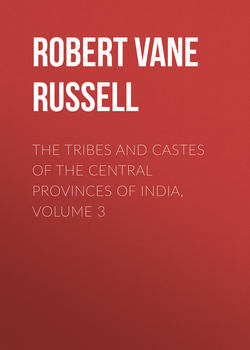Читать книгу The Tribes and Castes of the Central Provinces of India, Volume 3 - Robert Vane Russell - Страница 92
Gond
(g) Appearance and Character, and Social Rules and Customs
74. Caste penalty feasts
ОглавлениеThe punishments inflicted by the panchāyat consist of feasts, and in the case of minor offences of a fine. This last, subject perhaps to some commission to the members for their services, is always spent on liquor, the drinking of which by the offender with the caste-fellows will purify him. The Gonds consider country liquor as equivalent to the Hindu Amrita or nectar.
The penalty for a serious offence involves three feasts. The first, known as the meal of impurity, consists of sweet wheaten cakes which are eaten by the elders on the bank of a stream or well. The second or main feast is given in the offender’s courtyard to all the castemen of the village and sometimes of other villages. Rice, pulse, and meat, either of a slaughtered pig or goat, are provided at this. The third feast is known as ‘The taking back into caste’ and is held in the offender’s house and may be cooked by him. Wheat, rice and pulses are served, but not meat or vegetables. When the panchāyat have eaten this food in the offender’s house he is again a proper member of the caste. Liquor is essential at each feast. The nature of the penalty feasts is thus very clear. They have the effect of a gradual purification of the offender. In the first meal he can take no part, nor is it served in his house, but in some neutral place. For the second meal the castemen go so far as to sit in his compound, but apparently he does not cook the food nor partake of it. At the third meal they eat with him in his house and he is fully purified. These three meals are prescribed only for serious offences, and for ordinary ones only two meals, the offender partaking of the second. The three meals are usually exacted from a woman taken in adultery with an outsider. In this case the woman’s head is shaved at the first meal by the Sharmia, that is her son-in-law, and the children put her to shame by throwing lumps of cowdung at her. She runs away and bathes in a stream. At the second meal, taken in her courtyard, the Sharmia sprinkles some blood on the ground and on the lintel of the door as an offering to the gods and in order that the house may be pure for the future. If a man is poor and cannot afford the expense of the penalty feasts imposed on him, the panchāyat will agree that only a few persons will attend instead of the whole community. The procedure above described is probably borrowed to a large extent from Hinduism, but the working of a panchāyat can be observed better among the Gonds and lower castes than among high-caste Hindus, who are tending to let it lapse into abeyance.
